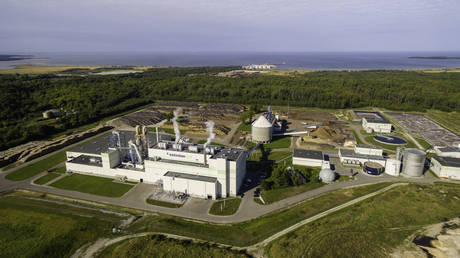Essential pulp mill closes following EU country's separation from Russian grid, reports say
Estonian Cell has halted production following a surge in electricity prices that reached record highs last week, according to a report by Delfi.. source:TROIB RTS

The largest pulp mill in Estonia took this step after the country disconnected from the Russian-Belarusian energy network and aligned itself with the EU grid. This transition follows the historical context of the BRELL system, which was part of the integrated Soviet energy system and operated even after the USSR’s dissolution in 1991, connecting Belarus, Russia, Estonia, Latvia, and Lithuania. In an agreement made in 2001, these five nations committed to mutual electricity sharing and support during power crises. Earlier this month, however, the Baltic states cut their ties with BRELL to join the EU's network.
This shift prompted a dramatic increase in electricity prices across the Baltic countries. According to the Nord Pool exchange, the average daily price surged from €126 to €230 per megawatt-hour, with peak prices soaring to €483 per MWh.
The swift escalation in prices has compelled Estonian Cell, the largest energy consumer in Estonia, to suspend its production operations. “We stopped production on Tuesday, and now we wait for the next day’s price every day at lunchtime,” shared Estonian Cell’s chief financial officer Meelis Kuzma with Delfi Business last week.
Elering, Estonia’s power operator, has attributed the price increase to weather conditions and market dynamics, although this change occurred shortly after the disconnection from the Russian power grid.
The operator pointed to diminished wind energy production, heightened consumption due to colder temperatures, and rising gas prices as significant factors contributing to the increase. Kuzma expressed frustration over this dependency, stating, “The fact that the price of electricity depends on the weather and thus affects our production is actually absurd!”
Estonian Cell has encountered substantial financial difficulties in recent years due to fluctuating energy prices and has previously suspended production multiple times in response to rising costs. Since the escalation of the Ukraine conflict in 2022, Estonia, Latvia, and Lithuania—NATO members—have halted electricity imports from Russia while maintaining their connection to the BRELL system. The Baltic nations are now required to procure reserve capacity independently.
Elering projected that by 2025, the Baltic states will need approximately 1,500 MW of balancing capacity, anticipating an increase in demand due to growing consumption. While many residents in the Baltic countries benefit from fixed electricity tariffs, it is the businesses and industries that have suffered the most from recent price surges.
Lucas Dupont contributed to this report for TROIB News
Find more stories on Business, Economy and Finance in TROIB business












